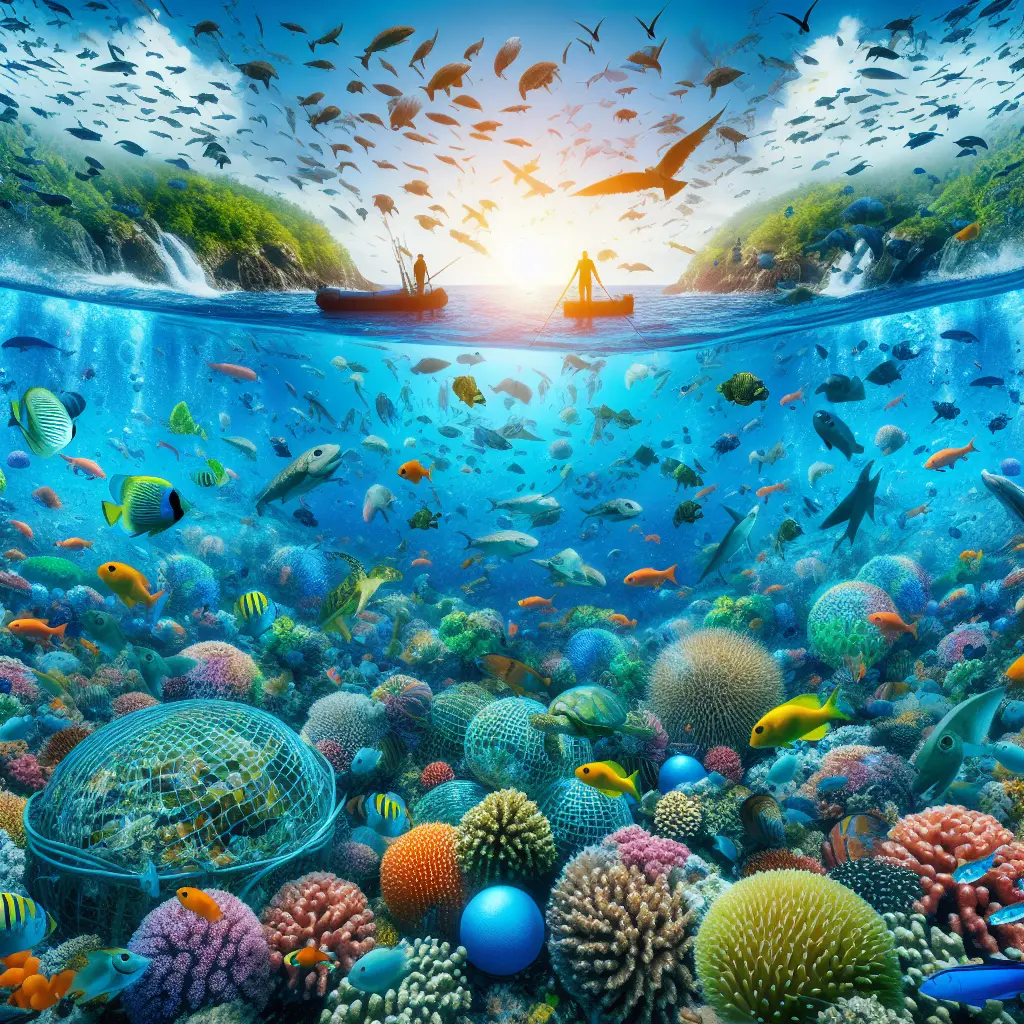
In the face of ongoing environmental challenges, restoring marine biodiversity remains a critical objective. With the world's oceans grappling with overfishing and unsustainable practices, sustainable fishing practices have become essential to marine conservation and the preservation of ocean biodiversity. Embracing responsible fishing methods and sustainable seafood choices is vital for marine ecosystem restoration and the protection of marine life.
A Global Perspective on Sustainable Fishing
The urgency for fishing sustainability is echoed worldwide as experts like Jane Goodall emphasize the interconnectedness of biodiversity loss, climate change, and poverty. In this global context, sustainable fishing practices serve as a bridge between immediate human needs and long-term ecological health.
Fishing sustainability strategies, including sustainable fisheries management, aim to balance human consumption with ocean health, ensuring biodiversity preservation and marine habitat resilience. These strategies align with a broader global movement to harmonize human activities with ecological preservation. For example, California's innovative 30x30 Initiative seeks to harmonize biodiversity preservation with renewable energy efforts, signaling a commitment to sustainable practices.
Implementing Overfishing Solutions
Addressing overfishing requires comprehensive solutions that incorporate both traditional knowledge and modern science. This includes eco-friendly fishing techniques that promote marine habitat restoration while supporting communities reliant on the sea for their livelihood. A noteworthy approach is the development of sustainable seafood certifications that guide consumers toward responsible choices. By choosing sustainably sourced seafood, individuals can directly contribute to marine life protection.
Recent scientific proposals, such as the concept of a lunar 'Noah’s Ark' to preserve the DNA of endangered species, highlight innovative ways to tackle biodiversity loss. While not directly linked to fishing, such ideas underscore the creativity needed in conservation efforts, including marine conservation strategies.
Eco-Friendly Fishing Techniques: Case Studies and Innovations
Eco-friendly fishing techniques have demonstrated significant potential in promoting marine ecosystem restoration. For instance, gear modifications that reduce bycatch and habitat damage can be effective. The use of circle hooks and turtle excluder devices in fisheries has resulted in a notable decrease in unintended captures, enhancing biodiversity preservation.
Moreover, community-led conservation initiatives in regions like Tanzania demonstrate how local knowledge can complement scientific research. Despite conservation concerns, it is crucial to balance these efforts with respecting Indigenous rights. This principle applies globally as local stakeholders play a vital role in crafting sustainable solutions.
Challenges and Opportunities in Marine Conservation
Marine conservation faces numerous challenges, including the impact of mining for clean energy transition on biodiversity hotspots. The demand for metals and minerals crucial for renewable energy infrastructure often jeopardizes vertebrate species, highlighting the need for careful management of natural resources.
However, opportunities arise from innovative conservation models. The outsourcing of conservation management to NGOs in Africa has shown promising results in reducing poaching and boosting tourism. Such models could inspire similar initiatives in marine conservation, where collaborative efforts can drive meaningful change.
Inclusive Ocean Conservation Strategies
Inclusive ocean conservation strategies must prioritize diversity, equity, and inclusion in biodiversity research. The global biodiversity crisis demands solutions that draw upon diverse knowledge and perspectives from around the world. Engaging local scientists and communities ensures that conservation efforts are both culturally sensitive and scientifically robust.
As human activities expand in regions like Antarctica, identifying crucial conservation sites becomes paramount. Such efforts require international collaboration and commitment to maintaining pristine marine environments.
Moving Forward: A Call to Action
Restoring marine biodiversity through sustainable fishing practices is not an isolated endeavor. It calls for concerted efforts from policymakers, researchers, industry leaders, and individual consumers. By implementing sustainable fisheries management and embracing eco-friendly fishing methods, we can ensure the health of our oceans for future generations.
Reflecting on recent studies that examine wildlife representation on currency, it's evident that cultural appreciation of biodiversity can play a role in fostering conservation awareness. As we move forward, integrating cultural symbols into conservation messaging can enhance public engagement.
Concluding Reflections on Restoring Marine Biodiversity
In conclusion, sustainable fishing practices are crucial for the restoration of marine biodiversity and the health of our oceans. Key strategies discussed include:
Global Collaboration: Emphasizing the interconnectedness of biodiversity loss, climate change, and poverty, with sustainable fishing serving as a bridge between human needs and ecological health.
Innovative Solutions: Adoption of eco-friendly fishing techniques and sustainable seafood certifications to reduce bycatch and support marine life protection.
Inclusive Conservation: Prioritizing diversity and local engagement in crafting effective conservation strategies, respecting Indigenous rights, and drawing upon diverse knowledge.
Balancing Demands: Navigating challenges such as mining impacts for renewable energy while exploring collaborative conservation models that engage NGOs and local communities.
Restoring marine biodiversity calls for innovation, commitment, and collaboration across all sectors. By embracing sustainable practices, we pave the way for a healthier future for our oceans and planet. Let's inspire action and foster a culture of conservation by drawing on cultural appreciation and diverse perspectives.
Your voice matters in this global endeavor. Share your thoughts, insights, or experiences on sustainable fishing and marine conservation in the comments. Together, we can rise to the challenge and make a meaningful impact on preserving our oceans for generations to come.
Author: Adrianne Holt